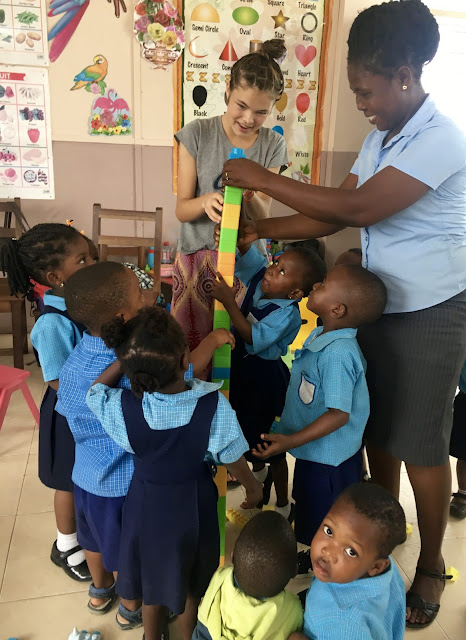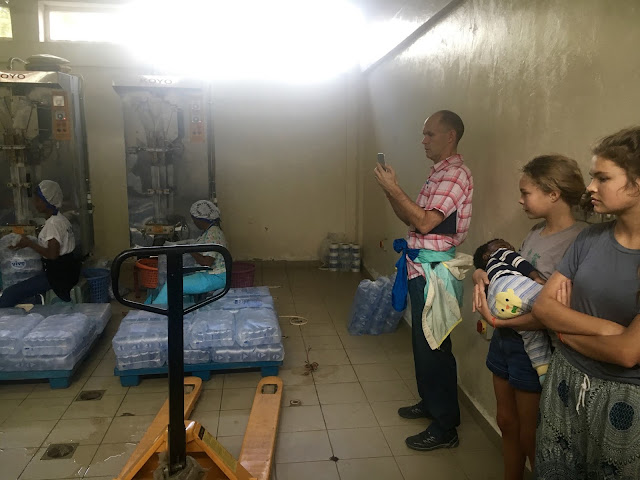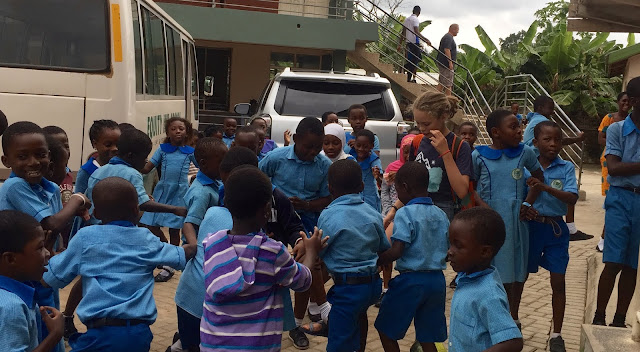There are many connections here from people we know at home, so we meet many people who are eager to show us around. The football camp people also know some of these people; that is why they are staying here at the same place and interacting with similar people. One such person is named Afasi.
Afasi is one of those people that knows everyone and how everything works in Ghana. He took us all to visit a school where he was making a donation from an American donor. The American donor Afasi represents here is very well known and respected, so we were treated as very distinguished guests. We got a tour through all of the classrooms of this very nice, private school.
Children are put in school as soon as they can walk.
They were very serious, almost afraid of us. We tried to ask questions about their work and engage them, but they mostly stood silent, answering our questions timidly.
By age 8 or so they are easily speaking in English and French. They will soon be adding Chinese to their languages. English is the common language, though. It is how the various tribal groups communicate with each other.
At the end of our tour it was lunch time and the children left their classrooms. It was like they were set free to be themselves. They surrounded us and gave us five and wanted to interact. These older girls loved Adele and Ceci.
I suggested to a group that we go play soccer in the little parking area, as our donation included a few balls. This is us making our way.
It wasn't organized play, more just a ball chase.
As soon as a ball was seen, swarms of kids came to join us. There must have been 150 kids going after that one ball! They were laughing and screaming and having so much fun.
Some teachers told me the only white people and/or Americans they see is on TV, so it was really good for us to be there in person.
Spectators.
More pleas to adopt African cuties.
In all government/public schools, as well as many private schools, children are required to keep their hair short. The explanation was to keep distraction at bay, much like the purpose of a uniform. This school was a mixture. Maybe a parent's choice?
Many asked Adele if her hair was real (long hair here is only had by extensions). They also asked if she was Chinese and if Ceci was Indian! Ha! They had never seen braces before and kept asking Ceci what was in her teeth.
This picture started off wth a few kids, but more came running to be in it. First smiles.
Next, funny face!
I wanted to hang out with these kids all afternoon. They were so much fun!
After about 30 minutes of play we noticed a man walking along the second floor yelling at the kids while tapping a cane stick in his hands. Those kids scattered to their classrooms lickety split. It then made sense why they all looked afraid to speak to us in their classrooms. They were afraid to make a wrong move!
Apparently, beating children is common. It is their form of discipline at home and at school. Children must behave. This is among all classes of people. Control by fear.
During all of our play there were some children at the gate who can't afford school. They really wanted to be a part of the fun. Adele saw them first and walked over to say hello. The older ones spoke English and we found out their names and ages. Occasionally we would break apart from the students and go try to include these children. People on the outside looking in. Looking in at what they don't have but would like: fun, education, food, clothing, money, opportunity, clean water, health.
We drove through Afasi's hometown on our way to a cocoa "factory" and farm.
A glance at a common market scene. We are astounded by what these people carry on their heads. This man has fabric, the woman behind him has eggs, and we saw a woman carrying a huge tub full of water bottles! Sometimes they have a round piece of fabric on their head to even things out and make it softer. Often it is right on their head. Unbelievable, and very resourceful!
Ghana is the world's second largest cocoa bean producer. The grow it, pick it, dry it, grind it, and sell it. They don't have the means to add value to it other than that. Then other countries resell chocolate in various forms back to Ghana, and most people can't afford to buy it.
I only got one picture of us in front of a pile of cocoa pods.
That is Afasi in the center, and the other guys, aside from the cocoa guy holding the pod, are part of the football camp group.
The ride home through the mountains was long. It gave us a lot of time to ask Afasi questions. I'm not sure I understood everything 100%, but I want to remember what I heard. Hopefully I can build on this initial understanding.
In the towns and villages, there are goats, chickens and occasional cows seen. All skinny. There are fewer dogs. I asked if they eat the eggs from the chickens, or if they milk the goats and cows. He laughed incredulously and said, "We EAT the chickens, goats and cows (and dogs)!" Again, they can not add value to eggs or milk. There is no refrigeration or pasteurization, so they eat their animals and buy imported milk. So couldn't they milk a goat or cow and sell it in small batches to the local stores who must have refrigerators for the imported milk? I guess there is the pasteurization and clean bottle issue. These are the kinds of things Geoff is here to explore and figure out. It is all very interesting. The need is so great. As a result, children in the towns and villages often can't afford the imported milk, and they rarely afford eggs, if there even are any in their markets. Lack of protein is common.
Children in these same locations most commonly die of malaria and cholera. There are obviously some measures to prevent malaria, but even when one gets it, they can be treated successfully. Most people can't afford to get to a hospital and the medicine is expensive. I asked if the medicine were provided locally if people would pay for it. He said they would, it just isn't accessible. Cholera is just plain deadly, but education and access to clean water would solve the problem. The problems and lack of resources seem endless. Even human resources are scarce. A few Ghanaians have been educated abroad and bring great skills to their country, but they are few. The teachers in schools aren't trained. The government schools are not good and teachers are lacking skills, but so are the private schools! One private school is affordable because they recruit out of high school, give an ipad with the curriculum on it and give them a classroom full of students, so teacher training and development is essential to raise a generation of thinkers and capable workers.
Maybe most suppressing of all is the overall belief system. Afasi explained that many people are Christians, but the traditional belief system trumps all other beliefs. As a member of the Mormon faith, he said the missionaries come and try to impose American beliefs on the people, but that we do not understand that we can not change the cultural beliefs of the African people. For example, no Africans go to the beach or near a river on Tuesdays. It is believed that if you do, you will be cursed by the gods, as well as everyone else for not keeping you away. Or if someone gets sick, they wonder who cursed them. Afasi told of someone at a church function who had brought a dish of food to share. Someone died suddenly, soon after the church event. The blame was toward the person who brought the dish of food to share. Authorities were called and the person was arrested and sent to jail. It so happened that this person had connections. An autopsy was performed (a very uncommon thing to do in Ghana), and it was discovered that the dead person had a very advanced case of cholera. The imprisoned food bearer was released from prison, with a tarnished reputation and family relations that were leery of his integrity.
The King of the Ashanti (ancient kingdom that still exists) is more powerful than the current president. I can only make sense of it by comparing it to the Pope and the Italian government. If not in modern times, than like in times during the Renaissance, for example. When the Ashanti king or his "traditionalist council" states that punishment from the gods will come to any who make music during such and such dates (weeks at a time), the government and police will enforce it. These superstitious beliefs are stronger than any gospel belief or government law. It is so deep in their psyche and world view, that they see any other belief as an
imposed belief.
I was reminded of a woman I met last year who visited with an African tribe who was seeking help. They felt the entire tribe was cursed. After visiting with them she tried to explain that the curse was self-imposed; their belief that they were cursed is what kept them feeling cursed! I can now see this for myself. For an entire continent. I pressed Afasi (respectfully). Wasn't this
fear? He agreed that it was, but he, nor anyone he knows, is willing to go against it. Fear is a bondage. It is a master. But I acknowledge that the fear is real for these people. I acknowledge that I'm just scratching the surface of this belief system and there is still so much to understand. Sure, I can hear this and think this is all crazy, but it has made me wonder what belief systems our culture has that keep us in bondage, or even personal beliefs I have. Who am I to judge?
While we are here we will go see a slave castle, the point where captives boarded ships on their way to a life of slave labor. As I've driven around and looked at this beautiful people going about their lives, I tried to imagine a rounding up to sell them off. The thought is revolting and evil! People just like you and me. Yet child sex slavery is still very common here. Parents sell them off, and parents (local or international) continue to buy. Afasi, frustrated with his own people, does not seem so marred by his people's history. He sees that they still take part in slavery, so how can they shun it.
This was a 90-minute conversation. I hope to process it all and make sense of it enough to continue to ask questions. I appreciate Afasi's willingness to be open, to be okay with my confronting his beliefs. I appreciate that he wants to share what is real here in Ghana and in Africa.
Every day I pray to have eyes to see, ears to hear and to feel what God wants me to feel. This day took me to some limits. Maybe some day I'll have words to express it. I now pray God will help give me compassion and a clear view of TRUTH.






























































